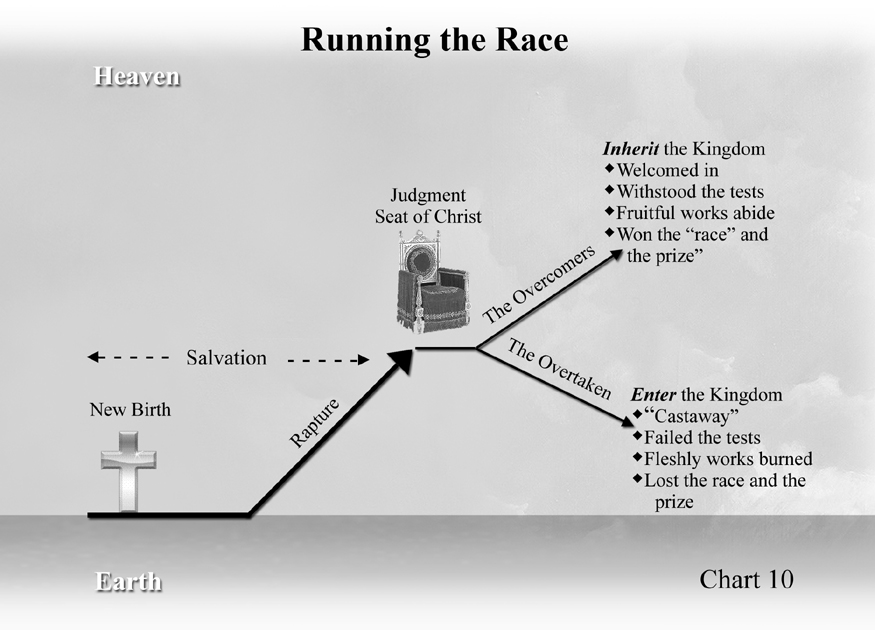So far in our Kingdom, Power and Glory series we have learned that not only our rewards, but also our place of responsibility in the coming Millennial Kingdom will either be won or lost according to our faithfulness in this life. In other words, the way we live our lives here and now will have eternal and unchangeable consequences in the future reign of Christ.
All believers will be with Christ in the Millennium, but only the overcomers—only those faithful and obedient believers who recognize their choices and allow Christ to live His Life out through them—will inherit levels of responsibility there. Consequently, there is an urgent need in the body of Christ for a renewed recognition of our own accountability and a refreshed understanding of the reason for our salvation.
Speaking of the importance of our accountability, let’s look at how Paul, the great apostle, viewed entering and inheriting this future Millennial Kingdom.
Paul wrote 14 books of the Bible (Romans, 1st and 2nd Corinthians, Galatians, Ephesians, Philippians, Colossians, 1st and 2nd Thessalonians, 1st and 2nd Timothy, Titus, Philemon and probably Hebrews), yet he tells us in 1 Corinthians 9:24-27 that he was fearful of not winning the prize (the prize of the reward of inheritance) and, somehow, becoming a “castaway.”
Listen to what he says: “Know ye not that they who run in a race run all, but one receiveth the prize? So run, that ye may obtain. And every man that striveth for the mastery is temperate in all things. Now they do it to obtain a corruptible crown, but we, an incorruptible. I, therefore, so run, not as uncertainly; so fight I, not as one that beateth the air; But I keep under my body, and bring it into subjection, lest by any means, when I have preached to others, I myself should be a castaway.”
The word “lest” (Strong’s #3381, mepos) in the above Scripture means “God forbid that I should.” The word “castaway” (Strong’s #96, adokimos) means someone who is unapproved, rejected and worthless. It means someone who is tested for proof, but who fails the test (is not able to withstand it) and is, then, rejected. “Castaway” means one who is not worthy (axios) of inheriting because he is not fit, prepared or ready.
Kenneth Wuest says in his book, Word Studies in the Greek New Testament, “castaway means disapproval after having failed to meet the requirements.” Wuest says that if a Greek runner broke training, they would be forbidden to race. Castaway simply means “disqualified.”1
Titus 1:16 further demonstrates Paul’s concern about being a castaway, when he talks about our works portraying the truth about our life: “They profess that they know God [Strong’s #1492, eido - to know intimately], but in works they deny Him, being abominable, and disobedient.”
What is it that the apostle Paul was so intent about keeping, while at the same time, acknowledging that it could be lost? He never doubted his “justification” for a moment, as he preached in Romans 8:38-39 that “nothing would separate us from the Love of God.” But he was concerned about losing the prize of the reward of inheritance (Colossians 3:24).
Paul knew that it was possible to be saved and yet still not participate in the coming Kingdom (to be justified and, yet not have a part or a role in the Millennium), i.e., to be a “castaway.” (1 Corinthians 9:27) And this made him apprehensive. I’m sure he probably remembered Moses, who was not permitted to enter the “Promised Land” because of disobedience at the end of his life. (Deuteronomy 3:25-26) Paul was worried that his own life’s work could be burned in the end and he could suffer “loss.” That’s why he wrote 1 Corinthians 3:15: “If any man’s work abide which he hath built upon it, he shall receive a reward. [But] if any man’s work shall be burned, he shall suffer loss; but he himself shall be saved, yet as by fire.”
“Saved, yet as by fire” means “barely saved,” or saved with difficulty. “Loss” in this Scripture means to forfeit one’s inheritance or forfeit something that could have been in one’s possession.
Who is Paul talking about here? Non-believers? No way. He is talking about believers because according to the above 1 Corinthians 3 Scripture these people are saved in the end. He’s talking about “believers who suffer loss.” They became “castaways,” not worthy of inheriting.
Paul is warning us that ruling and reigning in the kingdom is not a “given;” it’s not automatic; and, we all won’t win the prize! It’s very possible to defile our garments like those in Sardis, fail the test and become “a castaway.”
Martyn Lloyd Jones quotes 1 Corinthians 3:15 in his book Life in the Spirit and comments: “This is a great mystery...but the teaching seems to be clear. It does not mean that a man can fall from grace; but it does mean that a man who is saved can know the terror of the Lord.”2
In Philippians 3:13-14 Paul exhorts us: “Brethren, I count not myself to have apprehended; but this one thing I do, forgetting those things which are behind, and reaching forth unto those things which are before, I press toward the mark for the prize of the high calling of God in Christ Jesus.”

Just as Paul, himself, agonized and strained every muscle of his being as he sought to win the prize of the high calling, so He is exhorting every one of us to “lay aside every weight and run the race.” (Hebrews 12:1) He wants us to win! (1 Timothy 6:12; 2 Corinthians 11:25-28) He doesn’t want us to be “over-taken” by the world, the flesh and the devil, but to be “overcomers.” He wants our “works” to withstand the test of fire, so that we are welcomed into the kingdom and win the prize.
The end of the race for us will either be “victory” or “defeat.” We will either overcome or be overtaken. The “goal” of the race is that we might become “partakers of His holiness” (conformed into His image) and win the prize. (Hebrews 12:10) This is the reason why Satan is on such a rampage to destroy the message of overcoming and inheriting the kingdom. He can’t let us win! He must keep us failing the test, becoming castaways and losing the prize. (Yes, the prize can be lost!)
Life Is Like a Contest
What Paul is saying here is that the Christian life is somewhat like a “contest” or a race. Every one of us, whether we like it or not (if we are believers), is “enrolled” in that race. Therefore, if we want to win, we must lay aside every weight and run the race with all our might.3
Our conversion experience simply enters us into the race. But, then, like Paul, we must press on toward the goal of “the prize of the high calling”—a share in the Millennial reign of Christ. As in all races, prizes will be given out at the very end. (1 Corinthians 9:24) Hebrews 11:6 confirms this: “Without faith it is impossible to please Him; for he that cometh to God must believe that He is, and that He is a rewarder of them that diligently seek Him.” The Kingdom of Heaven is set before us as an object to be sought and a prize to be won.4
Justification is a “gift” that is bestowed upon us without a price, and earns us a place in the kingdom;5 whereas, experiential sanctification is part of a “prize” gained through performance.6 All of us can run the race, but only the overcomers will win the prize.
Our life here and now just happens to be the “testing ground” or the proving ground to see how we do in that race. It’s the score card! Every choice we make and every action we take is being registered and weighed for approval in the next life. There are five books in heaven that record everything we do here and that will be opened and read at the Judgment Seat of Christ.
As we said, being “born again” simply enters us into the race. But then, like Paul, we must each press on toward the “goal,” or the prize of the high calling in order to finish the race.
God has given each of us different talents, abilities and giftings to advance the Kingdom of God here on earth. The question is: What have we done with these talents? Have we used them wisely, squandered them or buried them?
Next month we’ll study the Parable of the Ten Talents and see what consequences are in store for those who fail to win the prize.
Next Month: “The Parable of the Ten Talents.” This article has been excerpted in part from Chuck and Nan’s new book The Kingdom, Power and Glory.
Notes:
- Word Studies in the Greek New Testament, Vol. 3, page 114-115.
- Martyn Lloyd Jones, Life in the Spirit, Page 78-80, 363-364, 370.
- Hebrews 12:1; Luke 6:22-24.
- Matthew 5:1-12; 6:1-13; Revelation 11:18; 22:12; Luke 14:12-14; Philippians 3:14; 2 Thessalonians 1:4-5; Revelation 3:21.
- Romans 6:23; Ephesians 2:8; John 3:15-16; 17:2; 1 John 5:11.
- Colossians 1:12; 3:24; Ephesians 2:10; Revelation 21:7.




